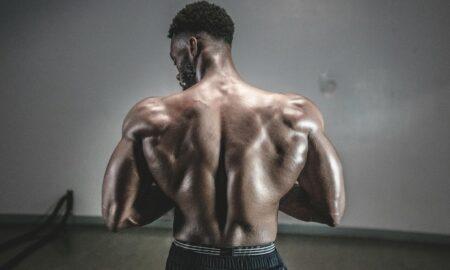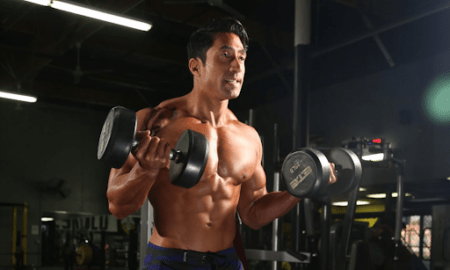Weightlifting will make you 20 years younger. Scientists compared 54 weightlifters (aged 40 to 87) who were competitors in the World Masters Weightlifting Championships in 1999 with healthy untrained individuals of the same age. On average, the weightlifters could generate 32 percent more peak power and isometric force in their legs. They could also generate peak force 13 percent quicker than their sedentary counterparts. So in essence, they were stronger and more powerful. Oddly enough, muscle volume of the legs was no different, which would mean that the middle-aged to older weightlifters were better at activating their muscle fibers.
Another interesting observation was that peak power declined at similar rates (1.2 to 1.3 percent per year starting at age 45) and strength declined similarly (0.5 to 0.6 percent per year). However, the average 85-year-old lifter was at least as strong as the 65-year-old untrained individual.
Bottom line: Keep lifting! When you turn 70, you'll know you can hold your own against some 50-year-old whippersnapper.
Say no to nor? Chemical cousins of the popular yet ineffective andro, the norandros (specifically, 19-norandrostenedione and 19-norandrostenediol) have never gotten the same attention'but then again, maybe they shouldn't. According to recent work published in the journal Nutrition, Van Gammeren and his band of savvy scientists looked at the effects of norsteroid supplementation (224 milligrams of 19-norandrostenedione and 120 milligrams of 19-norandrostenediol, for a total of 344 milligrams per day for eight weeks) on body composition and strength in weight-trained men. So at least they tested it on guys who lift weights rather than guys who can barely lift their butts off the couch.
What did they find? Not a damn thing. There was no difference between the effects of the placebo and nor steroids with regard to strength or size'nothing. So does that mean they don't work? Not necessarily. Perhaps a higher dose, a longer treatment duration or a different population (for instance, women) might have resulted in significant gains. For now, at least under these conditions, the norsteroids had no effect.
Super sugar? Ribose is a five-carbon sugar that's found in important molecules such as ATP, vitamins and nucleic acids (e.g., DNA). Under normal physiologic conditions, the body maintains levels of ATP and other energy substrates. So the question is, Would providing more ribose somehow affect one's ATP levels? And if so, what kind of dose are we talking here?
Interestingly, a study published in Current Therapeutic Research looked at the potential that ribose has as an ergogenic aid for bodybuilders. Recreational male bodybuilders, age 24, were randomly assigned to a placebo or ribose-supplemented group. Subjects took the placebo (dextrose) or five grams of ribose 30 to 60 minutes before and 30 to 60 minutes after training. On days they had off, they took the placebo or ribose at their convenience. Each subject followed a typical bodybuilding training regimen that consisted of a three-day split: 1) chest, shoulders and triceps; 2) legs; 3) back and biceps.
The study lasted four weeks. The ribose group experienced a significant increase in muscular endurance as measured by total number of repetitions performed on a bench press, as well as a significant increase in bench press 1RM strength; however, there were no differences in body composition (either in percentage of fat or lean body mass) between the two groups.
If you take 10 grams of ribose daily for one month, you might experience a gain in pectoral strength and endurance, but it won't be accompanied by an increase in muscle mass. It should be noted that a 10-gram dose is relatively high and may preclude some athletes from using ribose; however, if you're a serious competitive athlete and are looking for any possible (and legal) advantage, a 10-gram dose of ribose daily might be a useful adjunct to your training and nutrition regimen.
References Pearson, S.J., et al. (2002). Muscle function in elite masters weightlifters. Medicine and Science in Sports and Exercise. 34:1199-206. Van Gammeren, D., et al. (2002). Effects of norandrostenedione and norandrostenediol in resistance-trained men. Nutrition. 18:734-737. Van Gammeren, D., et al. (2002). The effects of ribose supplementation on body composition and exercise performance in healthy, young, male recreational bodybuilders. Current Therapeutic Research. 63(8):486-495.
Editor's note: Jose Antonio, Ph.D., CSCS, earned his doctorate at the University of Texas Southwestern Medical Center. He is a co-editor (with Jeffrey R. Stout, Ph.D.) of and contributor to Sports Supplements (Lippincott Williams & Wilkins), Sports Supplement Encyclopedia (Nutricia), Supplements for Strength-Power Athletes (Human Kinetics) and Supplements for Endurance Athletes (Human Kinetics). For more information visit www.supplementbooks.com.




















You must be logged in to post a comment Login